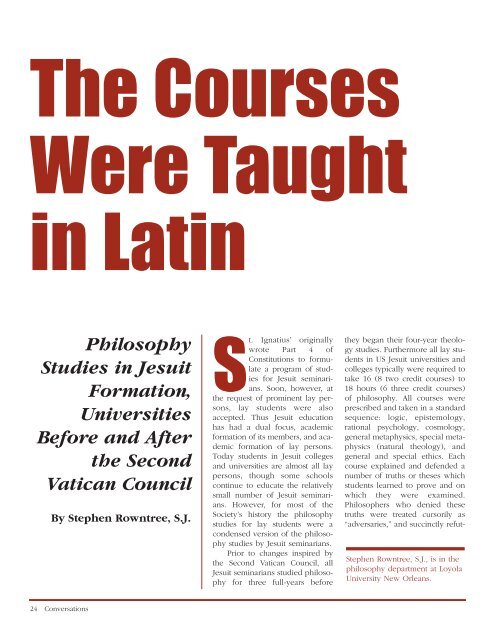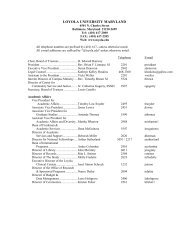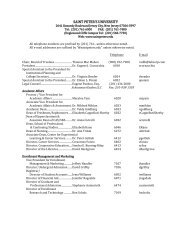to download it today - Association of Jesuit Colleges and Universities
to download it today - Association of Jesuit Colleges and Universities
to download it today - Association of Jesuit Colleges and Universities
Create successful ePaper yourself
Turn your PDF publications into a flip-book with our unique Google optimized e-Paper software.
The Courses<br />
Were Taught<br />
in Latin<br />
Philosophy<br />
Studies in Jesu<strong>it</strong><br />
Formation,<br />
Univers<strong>it</strong>ies<br />
Before <strong>and</strong> After<br />
the Second<br />
Vatican Council<br />
By Stephen Rowntree, S.J.<br />
24 Conversations<br />
St. Ignatius’ originally<br />
wrote Part 4 <strong>of</strong><br />
Const<strong>it</strong>utions <strong>to</strong> formulate<br />
a program <strong>of</strong> studies<br />
for Jesu<strong>it</strong> seminarians.<br />
Soon, however, at<br />
the request <strong>of</strong> prominent lay persons,<br />
lay students were also<br />
accepted. Thus Jesu<strong>it</strong> education<br />
has had a dual focus, academic<br />
formation <strong>of</strong> <strong>it</strong>s members, <strong>and</strong> academic<br />
formation <strong>of</strong> lay persons.<br />
Today students in Jesu<strong>it</strong> colleges<br />
<strong>and</strong> univers<strong>it</strong>ies are almost all lay<br />
persons, though some schools<br />
continue <strong>to</strong> educate the relatively<br />
small number <strong>of</strong> Jesu<strong>it</strong> seminarians.<br />
However, for most <strong>of</strong> the<br />
Society’s his<strong>to</strong>ry the philosophy<br />
studies for lay students were a<br />
condensed version <strong>of</strong> the philosophy<br />
studies by Jesu<strong>it</strong> seminarians.<br />
Prior <strong>to</strong> changes inspired by<br />
the Second Vatican Council, all<br />
Jesu<strong>it</strong> seminarians studied philosophy<br />
for three full-years before<br />
they began their four-year theology<br />
studies. Furthermore all lay students<br />
in US Jesu<strong>it</strong> univers<strong>it</strong>ies <strong>and</strong><br />
colleges typically were required <strong>to</strong><br />
take 16 (8 two cred<strong>it</strong> courses) <strong>to</strong><br />
18 hours (6 three cred<strong>it</strong> courses)<br />
<strong>of</strong> philosophy. All courses were<br />
prescribed <strong>and</strong> taken in a st<strong>and</strong>ard<br />
sequence: logic, epistemology,<br />
rational psychology, cosmology,<br />
general metaphysics, special metaphysics<br />
(natural theology), <strong>and</strong><br />
general <strong>and</strong> special ethics. Each<br />
course explained <strong>and</strong> defended a<br />
number <strong>of</strong> truths or theses which<br />
students learned <strong>to</strong> prove <strong>and</strong> on<br />
which they were examined.<br />
Philosophers who denied these<br />
truths were treated cursorily as<br />
“adversaries,” <strong>and</strong> succinctly refut-<br />
Stephen Rowntree, S.J., is in the<br />
philosophy department at Loyola<br />
Univers<strong>it</strong>y New Orleans.




